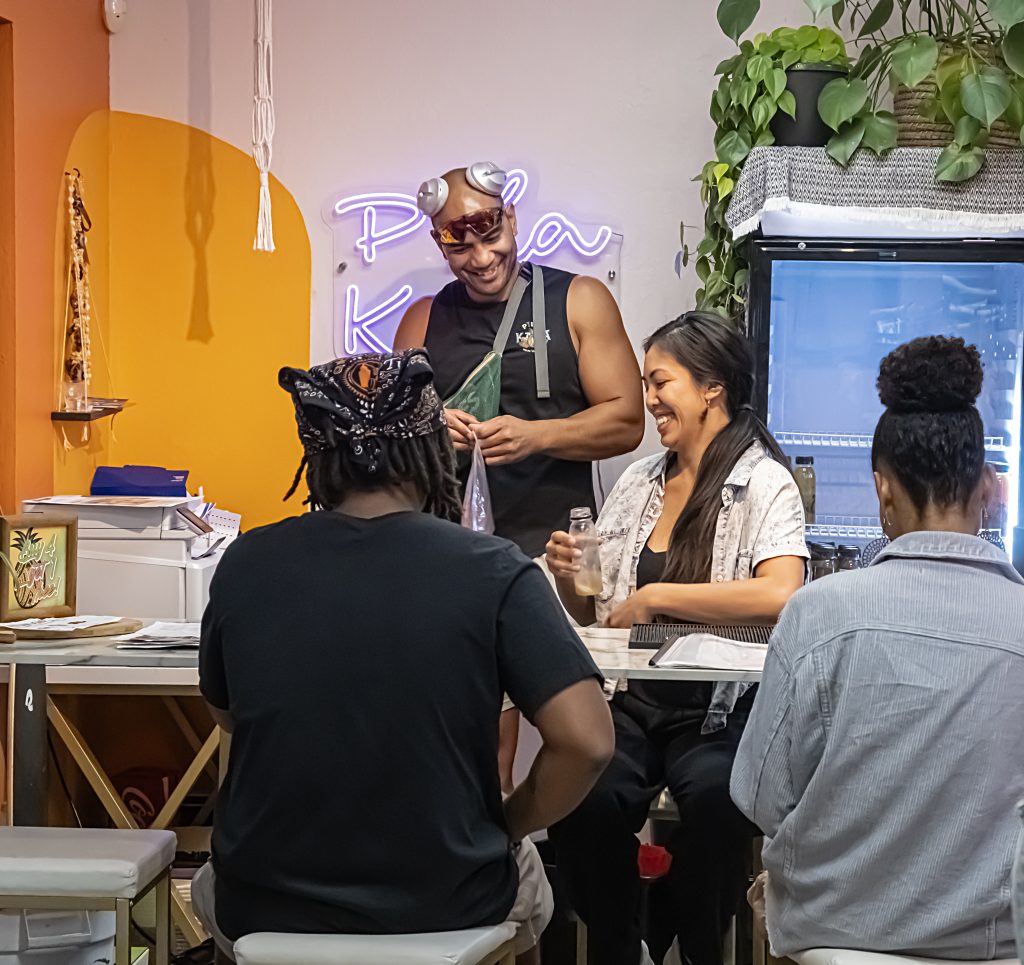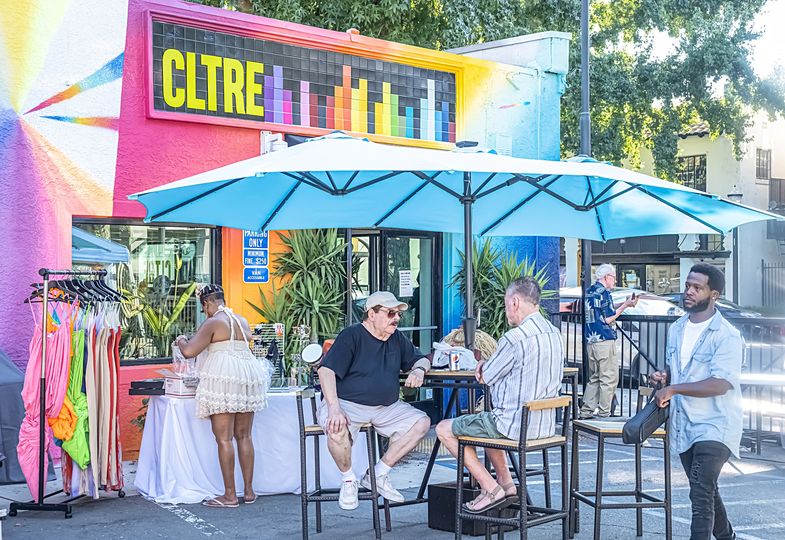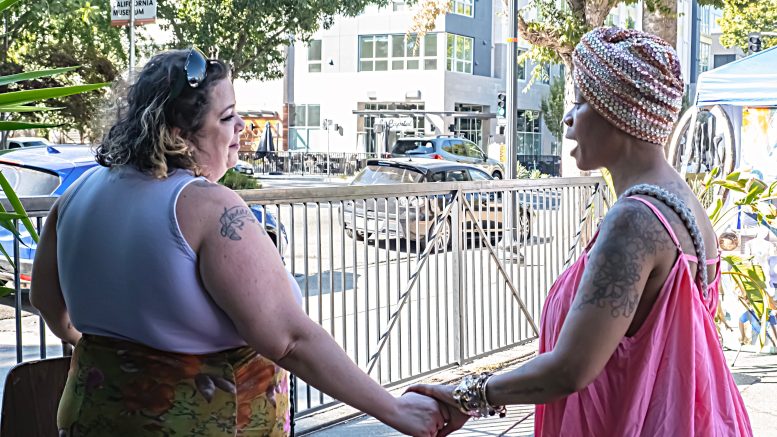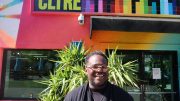By Gavin Hudson
Roshaun Davis, co-founder of Unseen Heroes and its sister nonprofit CLTRE, noticed that talent born in Sacramento rarely tended to stay, which led to out-of-market companies coming to claim parts of the city and many talented and creative residents leaving for opportunities elsewhere. CLTRE Club was born as an idea to combat that phenomena.
Launched in May 2023, CLTRE Club is a collaborative project built to sustain the culture of Sacramento by supporting small business owners. The project prioritizes supporting entrepreneurs of color looking to plant their flag in the local market.
“It is designed to help microbusiness and small entrepreneurs, especially under a BIPOC lens, develop their brand. … We bring in mentors for them to talk to and learn from and share best practices,” Davis says. “We give them space in order to do so and we help them with all of the technical assistance that goes into operating a storefront for the long term.”
The seeds for CLTRE Club began with Davis’s first enterprise, Unseen Heroes, a public relations firm aimed at expanding creativity in its client’s culture.
“My wife and I started Unseen Heros in 2008, and during that time we were seeing a lot of our homies were just like, leaving; just going to San Francisco, LA and New York. Just because the creativity and the culture creatives were better in those spaces. We started just rolling up our sleeves here to try and pave that way,” Davis says. “It just became apparent to me, especially during the pandemic, the way we’re going to develop as a community, that is for locals by locals, is we have to come together and not do it separately.”
Supporting micro-businesses

CLTRE, meaning both “Creating Leverage To Ready Entrepreneurs,” and “Community Lead Transformative Real Estate,” is a Community Development Corporation with the self-appointed goal of “shifting the cultural landscape in Sacramento by year 2040.”
During the pandemic, Davis and his wife, Maritza Davis, started looking into CDCs, which are nonprofit organizations that aim to uplift neighborhoods by supporting local business and developing affordable housing. Davis says CDCs focus on two things: “empowering locals to be entrepreneurs and community ownership of buildings and property in the neighborhoods.”
After creating CLTRE, the founders partnered with Capitol Area Development Authority and its Executive Director Danielle Foster to create the CLTRE Club in order to host and support local microbusinesses.
“The CLTRE Club itself is a business incubator program, where small businesses are able to rent out a portion of the space for really low, affordable rent,” says Quynh Yamamoto, co-owner of Pila Kava, which has a space in the brick-and-mortar building that houses CLTRE Club.
The Club is located downtown at 1409 16th St., where an Enterprise car rental location used to be. Within its walls are six microbusinesses: Black Coffee Roastery, La Pop Shop, Lingers, Pila Kava, Pony and Thriftstorefly. The owner of a seventh business, Cleo Cartel, recently died.
Business owners pitch their business to the Club and, if selected, operate in a portion of the indoor space. The owners contribute $125 to the Club for utilities each month and donate 5% of their sales to CLTRE, with CADA pitching in to help cover additional costs for the businesses. Additionally, they are allowed to use the space to host events and expand their customer base.
Yamamoto and her business partner, who goes by Happy, host a semiweekly “Yogging” event at the club where participants drink Kava and then jog or walk to benefit from the drink’s “anti-inflammatory” properties and additional effects.
“[Pila Kava] is more than just a self-care drink,” Yamamoto says. “We’re a lifestyle as well. So why not utilize the opportunity to have the space to host whatever it is we want to cultivate?”
The newest addition to the club’s family of microbusiness is Thriftstorefly, Mersadez Hogan’s curated thrift market for plus-sized women that aims to provide fashionable options in a range of sizes.
“I think Sacramento is highly underrated with the fashion theme. I mean, people dress really well here and I don’t think we get enough credit,” says Hogan. “I think that me being here at CLTRE will help bring that to light. Like, ‘Hey, we do like fashion here. We may not be New York or LA or even San Francisco, but we have some really great places to shop here.”
Before Thriftstorefly became a reality, Hogan hosted thrift exchanges at dance studios and other community spaces until the pandemic struck. During COVID, Hogan began workshopping ways to turn her work into a business and with the help of CLTRE Club, her business now has a home.
With the club less than a year into its 17-year plan, Pila Kava’s co-owner Happy says the Club hasn’t impacted the community yet, although he believes the signs of success are present.
“It’s going to take time for it to integrate into this community. [A] lot of the time people are still coming in, they still don’t know what CLTRE is,” Happy says. “People are showing up every day, and that goal we’re achieving because all it takes is consistency.”
A focus on real estate

While CLTRE Club focuses on businesses, CLTRE is working with the City of Sacramento on a program to provide homeownership resources to first-time buyers in underserved communities.
The eight-week CLTRE Keeper First-time Home Buyer program provides financial and educational resources to BIPOC individuals with a, “gross annual income at or below 80% of the local Area Median Income,” according to a city press release.
Those selected for the program will receive a $15,000 home loan (that can be forgiven after 10 years) with an additional $1,500 in flex spending.
The program looks to spotlight opportunities for new homebuyers, such as government-backed home buying initiatives and down payment assistance programs. It will also provide recommendations of local real estate agents, the City’s Financial Empowerment Center and nonprofit organizations capable of offering additional assistance.
The program is one of many in the city’s $10 million Stockton Boulevard Housing Stabilization effort looking to revitalize communities around the UC Davis Aggie Square project.
This story is part of the Solving Sacramento journalism collaborative. Solving Sacramento is supported by funding from the James Irvine Foundation and Solutions Journalism Network. Our partners include California Groundbreakers, Capital Public Radio, Outword, Russian America Media, Sacramento Business Journal, Sacramento News & Review, Sacramento Observer and Univision 19.



Be the first to comment on "How support for diverse micro-businesses is shifting Sacramento’s ‘cultural landscape’"